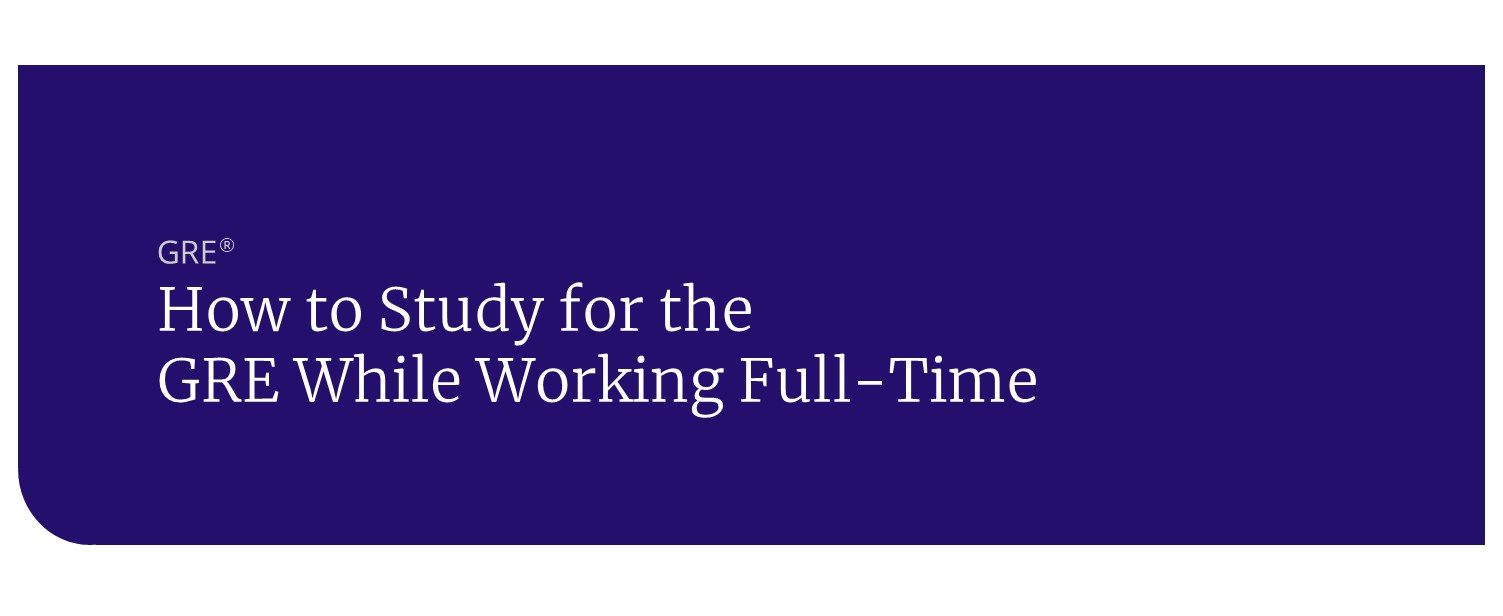How to Study for the GRE While Working Full-Time
Preparing for the GRE while managing your full-time career can feel like taking on a second job, but with the right plan, it’s absolutely achievable. Whether you’re hoping to earn a promotion, change careers, or apply to graduate school, understanding how to study for the GRE while working full-time comes down to using your limited hours strategically. With a realistic schedule, efficient study methods, and the right prep tools, even the busiest professionals can make steady progress toward their goal score.
Many professionals preparing for graduate school face the same challenges–finding time to study between work, life, and everything else. That’s why GRE prep for working professionals needs to be flexible and designed around real schedules. Kaplan and Manhattan Prep Powered by Kaplan’s self-paced and live online courses make it possible to study whenever it fits your schedule, whether that’s before work, during lunch breaks, or late at night. With expert-led lessons and adaptable resources, you can follow a GRE study plan while working full-time that helps you stay consistent, confident, and ready for test day.
How to Balance Work and GRE Prep (and Still Succeed)
Balancing a full-time job and GRE prep can feel like a juggling act–but it’s completely doable with the right strategy. Many professionals worry they don’t have enough time to study, but learning how to balance work and GRE prep is really about planning, consistency, and realistic goals. Even with a packed schedule, you can earn a competitive score through intentional study habits and the right resources.
Here are some practical GRE study tips for working adults that actually work:
- Use your professional skills to your advantage. Time management, organization, and discipline are built into your daily work life–skills that make GRE prep for busy professionals easier than you think.
- Focus on quality over quantity. Short, focused sessions–30 to 60 minutes a few times a day–can be more effective than marathon study blocks.
- Create a realistic study schedule. Whether it’s early mornings or after dinner, treat study time like a non-negotiable meeting.
- Maximize your downtime. Use flashcards or quick practice tests during commutes or breaks to reinforce learning on the go.
- Choose flexible prep options. Online courses and mobile study tools make it simple to prepare 24/7.
Remember, the secret to success isn’t endless hours–it’s smart planning. With the right structure and steady motivation, working professionals can balance their careers and test prep while staying prepared and ready for test day.
How to Create a GRE Study Schedule Around a Full-Time Job
Building a realistic GRE study schedule is what turns good intentions into consistent progress. When you’re balancing a full-time job, the goal isn’t to study constantly–it’s to make every session count. A structured plan helps you focus on the right topics, track improvement, and keep momentum even when your workweek gets hectic.
Here’s how to craft a GRE study plan while working full-time that actually fits your routine:
- Anchor your schedule to your test date. Count backward from exam day to outline how many weeks you have to study, then divide that time between Quant, Verbal, and Writing prep.
- Block your best study windows. Identify when you’re most alert (mornings, lunch breaks, or evenings) and claim those hours for GRE prep.
- Mix short sessions with deeper dives. Combine quick weekday drills, like our free GRE 20-Minute Workout, with longer weekend reviews or practice tests.
- Prioritize your weak areas. Use diagnostic results or practice scores to focus on the sections where you’ll see the biggest gains.
- Review and adjust weekly. If work gets busy, shift study blocks instead of skipping them. Flexibility keeps your plan sustainable.
Efficient GRE Study Strategies for Busy Professionals
Once your study schedule is set, the next step is making every minute count. For those balancing long workdays and other responsibilities, a smart strategy matters more than study time alone. The most successful test-takers approach GRE prep for busy professionals with purpose, focusing on high-impact methods that build skills efficiently and fit within a demanding routine.
Try incorporating these proven, time-saving strategies into your plan:
- Start with a diagnostic test. Identify your strengths and weaknesses early so you can focus your study sessions where they matter most.
- Use focused micro-sessions. Ten to fifteen minutes of vocabulary or problem-solving practice during lunch or a commute can reinforce learning without adding stress.
- Leverage active recall and spaced repetition. Flashcards, practice tests, and review cycles help solidify long-term memory better than rereading notes.
- Simulate real test conditions. Full-length practice exams train your pacing and stamina–key for working professionals with limited time.
- Track progress weekly. Short reflections on what works and what didn’t make it easier to refine your plan instead of wasting time on ineffective study habits.
Sample GRE Study Schedule for Working Professionals
If you’re ready to turn strategy into action, here’s a GRE study plan designed to fit a full-time work schedule and keep your prep focused:
Weeks 1-2: Build Your Foundation
- Take a full-length diagnostic test to identify your strengths and weaknesses.
- Review GRE basics–math concepts, reading comprehension, and essay structure.
- Create your GRE prep study calendar using your preferred study windows, like 60-minute sessions after work and longer weekend blocks.
- End Week 2 by revisiting key vocabulary and reviewing missed diagnostic questions.
Weeks 3-4: Strengthen Quant and Vocabulary
- Follow your weekday study schedule (for example, Quant on Mondays and Wednesdays, vocab or Verbal on Tuesdays and Thursdays).
- Focus on high-yield Quant topics like algebra, geometry, and data interpretation.
- Use short study sessions for vocab drills and flashcards during commutes or breaks.
- Spend Saturday mornings on timed Quant sections and Sunday afternoons reviewing results.
Weeks 5-6: Sharpen Verbal and Writing Skills
- Shift more focus to reading comprehension and verbal reasoning.
- Dedicate one or two weekday sessions to Analytical Writing practice.
- Continue reviewing Quant to maintain balance, but make Verbal your priority.
- Take one full-length practice exam at the end of Week 6 to measure your progress.
Weeks 7-8: Simulate the Real Test
- Use your longer weekend study sessions for full-length practice exams under test conditions.
- Review score reports to identify pacing issues and focus your weekday sessions on problem areas.
- In your final week, prioritize review–formulas, essay outlines, and vocabulary reinforcement–while keeping study sessions shorter and lighter.
This GRE study plan for working professionals mirrors the flexible structure of the weekly schedule, making it easy to follow and adapt. It’s a practical GRE prep schedule example for anyone balancing work, life, and test prep–steady, focused, and built for real-world routines.
How Kaplan and Manhattan Prep Help You Prep Around a Full-Time Schedule
When your calendar is packed, flexibility isn’t a luxury–it’s a necessity. That’s why Kaplan and Manhattan Prep’s GRE prep is built to adapt to your schedule. Whether you prefer learning at your own pace or need the accountability of live instruction, Kaplan offers options designed to fit the way you work and study best.
Here’s how Kaplan helps make GRE prep manageable alongside a full-time job:
- Self-Paced Courses: Study anytime with Manhattan Prep’s Interact™ for GRE and Kaplan’s on-demand lessons, practice questions, and full-length tests that let you learn when it’s most convenient.
- Live Online Classes: Join expert instructors in real-time classes and get structured guidance–ideal for those who want accountability without commuting to a classroom.
- Adaptive Practice Tools: Manhattan Prep and Kaplan’s personalized practice questions adjust to your performance, helping you focus where you’ll see the biggest improvement.
- Mobile Study Access: Review courses from your phone during short breaks or commutes–perfect for busy professionals on the go.
- Expert Support: Access instructors and detailed analytics that keep you on track, even when your schedule gets unpredictable.
Flexible prep formats make it easier to fit GRE study into your life without throwing off your routine. Whether you’ve got half an hour after work or a few quiet hours on the weekend, these tools help you stay productive and keep your progress moving forward, no matter how busy your week gets.



